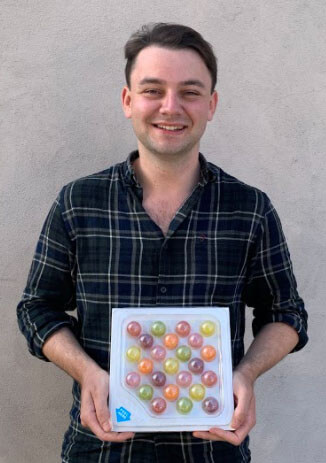LONDON start-up Jelly Drops is helping to boost proper hydration among elderly people and those living with dementia.
These groups have been among the hardest-hit by the pandemic, and frequently suffer from dehydration for the simple reason that they forget to drink. Some 37 percent of older people admitted to hospital are acutely dehydrated.
Jelly Drops are sugar-free water sweets, made up of 95 percent water and electrolytes.

They were developed by 26-year-old inventor, Lewis Hornby, in response to his late grandmother Pat’s struggle with dehydration due to dementia. After gaining insights from a month of living in Pat’s care home, Lewis developed the product with doctors, dieticians and speech and language therapists.
Jelly Drops is supported by several investors, including a £100,000 R&D investment from the Alzheimer’s Society as part of its new Innovation Accelerator Programme. The company will donate one percent of its profits to the charity.
After 18 months of development and several months of beta testing during Covid-19, the product has officially hit the UK market.
Jelly Drops has been working on trials with a number of care homes across the UK. With their obvious hydration benefits, the sweets have helped to give staff and relatives peace-of-mind about elderly family and friends. The teardrop-shaped sweets come in trays of 24, in six flavours: strawberry, raspberry, blackcurrant, orange, lemon and lime. Each tray equates to 300ml of water. The shape was designed to make them easy to pick up.
Inventor Hornby says initial response has been “fantastic”.
“We are very excited to supply the 50,000 people on our waiting list,” he said. “We have seen a huge demand from both care homes and the families of people with dementia… It’s been heartwarming to hear the feedback from our first customers; they enjoy Jelly Drops as much as Grandma did.”
Colin Capper, head of research and development at the Alzheimer’s Society, said the product was one of the first to be accepted into the Accelerator Programme. “We’ve been thrilled to support its journey,” he said. “Jelly Drops are key to helping overcome the everyday challenges faced by people with dementia, challenges that have been amplified by the pandemic.”
It’s projected that by 2050, some two million people in the UK will be living with dementia; at present, the figure stands at 850,000. Dementia has been identified as a leading killer of the 21st century, with £26bn spent by governments each year to help those affected.
* More information: www.jellydrops.com.




























